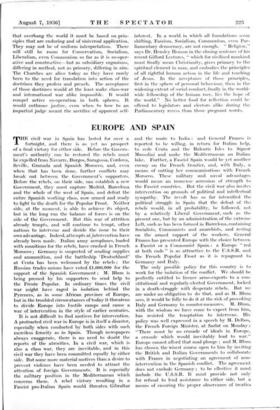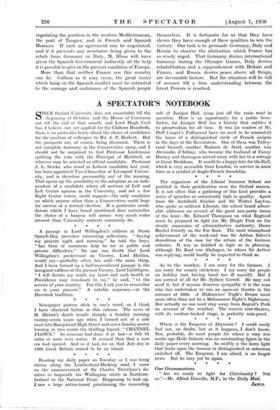EUROPE AND SPAIN
THE civil war in Spain has lasted for over a fortnight, and there is as yet no prospect of a final victory for either side. Before the Govern- ment's -authority can be restored the rebels must be expelled from Navarre, Burgos, Saragossa, Cordova, Seville, -Granada and Spanish Morocco, and, even when that has been done, further conflicts may break out between the Government's supporters. Before the rebels, on their' side, can establish a new Government, they must capture Madrid, Barcelona and fhe whole of the west of Spain, 'and defeat the entire Spanish working class, now armed and ready to fight to the 'death for the Popular Front. Neither Side, at the moment, is able td achieve its object, but in the long run the balance of forces is on the side of the Government. But this war of attrition already tempts, and will continue to tempt, other nations to intervene and decide the issue to their own advantage. Indeed, attempts at intervention have already been made. Italian army aeroplanes, loaded with munitions for the rebels, have crashed in French Morocco ; Germany is suspected of sending supplies and ammunition, and the battleship 'Deutschland' at Ceuta has been welcomed by the rebels ; the Russian trades unions have voted £1,000,000 for the suppoit of the Spanish Government ; M. Blum is being presSed by his supporters to send help to the Frente Popular. In ordinary times the civil war might have raged in isolation behind the Pyrenees, as in some African province of Europe, but in the troubled circumstances of today it threatens to divide Europe into hostile camps and cause a war of intervention in the style of earlier centuries.
It' is not difficult to find motives for intervention. A protracted civil War in Europe is in itself a disaster, • especially when conducted by both sides with such merciless ferocity as in Spain. Though newspapers always exaggerate, there is no need to doubt the reports of the atrocities. In a civil war, which is also a class war, they are inevitable, and in this civil war they have been committed equally. by either side. But some more material motives thin a desire to prevent violence have been needed to attract the attention of foreign Governments. It is especially the military position in the Mediterranean which concerns them. A rebel victory resulting in a Faseist pro-Italian Spain would threaten Gibraltar and the route to India : and General Franco is reported to be willing, in return for Italian help, to cede Ceuta and the Balearic Isles to Signor Mussolini and make the Mediterranean an Italian lake. Further, a Fascist Spain would be yet another enemy on the French frontier, and, with Italy, a means of cutting her communications with French Morocco. These military and naval advantages would' mean an immense accession ' of strength to the Fascist countries. But the civil war also invites intervention on grounds of political and intellectunl sympathy. The revolt has so far intensified the political struggle in Spain that the defeat of the rebels would, in all probability, be followed, not by a relatively Liberal Government, such as the present one, but by an administration of the extreme Left, such as has been formed in Barcelona, containing Socialists, Communists and anarchists, and resting on the armed support of the workers. General Franco has presented Europe with the choice between a Fascist or a Communist Spain : a Europe " red at both ends " is as attractive to the U.S.S.R. and the French Popular Front as it is repugnant to Germany and Italy.
The only possible policy for this country is to work for the isolation of the conflict. We should be perfectly entitled to licence arms-exports to a con- stitutional and regularly-elected Government, locked in a death-struggle with desperate rebels: But we are under no obligation to do that, and as M. Blum sees, it would be folly to do it at the risk of provoking Italy and Germany to counter-measures. M. Blum, With the wisdom we have come to expect from him, has resisted the temptation to intervene. His policy was well expressed in a speech by M.' Delbos, the French Foreign Minister, at Sarlat on Monday : "There must be no crusade of ideals in Europe, a crusade which would inevitably lead to war." Europe cannot afford that mad plunge ; and M. Blum has chosen the wisest course open to him by inviting the. British and Italian Governments to collaborate with France in, negotiating an agreeMent of non- intervention in the Spanish conflict. The agreement does not exclude Germany ; to be effective it must include the U.S.S.R. It must provide not only for refusal. to lend assistance to either side, but a means 'of' ensuring the proper observance of treaties regulating the position in the western Mediterranean, the port of Tangier, and in French and Spanish Morocco. If such an agreement can be negotiated, and if it prevents any assistance being given to the rebels from Germany or Italy, M. Blum will have given the Spanish Government indirectly all the help it is possible to give in the present condition of Europe.
More than that neither France nor this country can do. Callous as it may seem, the great issues which hang on the Spanish conflict must be entrusted to the courage and endurance of the Spanish people themselves. It is fortunate for us that they have shown they have enough of these qualities to win the victory. Our task is to persuade Germany, Italy and Russia to observe the abstention which France has so wisely urged. That Germany desires international harmony during the Olympic Games, Italy desires rehabilitation and a rapprochement with Britain and France, and Russia desires peace above all things, are favourable factors. But the situation will be full of menace till a firm understanding between the Great Powers is reached.







































 Previous page
Previous page